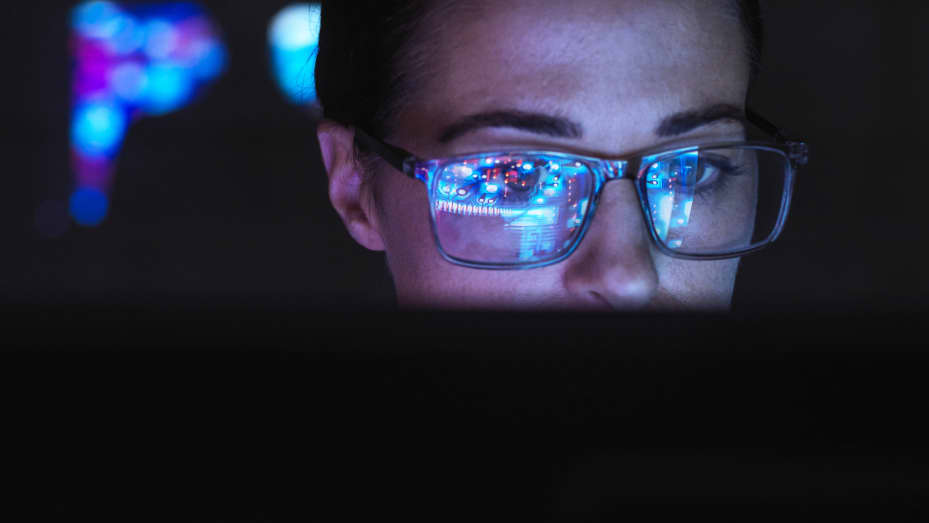As 2023 got underway, OpenAI’s ChatGPT was barely a month old and conversations about the impact of artificial intelligence on the workforce were just beginning. Fast forward to today and it’s hard not to hear about the ways in which generative AI will change how we get our jobs done — and whether some of those jobs will disappear completely.
Among employees, those who use AI at work today say they are more likely to view it as a positive, with 72% reporting that it has made them more productive, according to the latest CNBC|SurveyMonkey Workforce Survey.
Gen Zers (37%) and millennials (35%) are the most likely to have used AI in their jobs. Just 25% of Gen Xers and 17% of baby boomers report using AI tools like ChatGPT at work.
The survey also showed that AI is especially popular among workers of color, with 41% of Asian employees, 38% of Black and 36% of Hispanic workers having used AI software in their roles. That compares with 23% of white workers who said the same.
But with use of AI come concerns about the long-term impact on jobs.
The workers most concerned about AI
Despite workers’ positive feedback about AI, 42% of employees said they’re concerned about the technology’s impact on their jobs. Among individual contributors, 44% said they are “very or somewhat concerned,” compared to 38% of managers or higher.

Westend61 | Westend61 | Getty Images
The outlook on AI as a job threat also differed by salary. Workers making under $50,000 a year are more concerned (47%) about the technology’s impact compared with those making between $50,000 and $99,000 (39%) or $100,000 or more annually (36%).
And while AI tools may be used more frequently today among workers of color, the survey shows that these employees have some significant concerns about whether it will affect their jobs: 53% of Asian and Black workers, and 46% of Hispanic workers are “very or somewhat concerned,” compared with 37% of white employees.
That speaks to a broader survey finding: the more employees use AI at work, the more concerned they become. Sixty percent of those using AI regularly said they’re worried about its impact on their job, compared with 35% of those who don’t use AI at work.
The online poll was conducted December 4-8 by SurveyMonkey among a national sample of 7,776 workers in the United States.
How work will be ‘reassembled’
The debate over AI as a job killer is certainly far from settled. Some believe AI will eliminate certain jobs with repetitive, mundane tasks, like cashiers and truck drivers. Others, like Elon Musk believe it will vaporize all jobs.
As companies continue to figure it out, there are those who say employees are operating under some misconceptions about the technology. At CNBC’s recent Work Summit, social scientist and Harvard University professor Arthur C. Brooks, who studies happiness, said AI is more likely to “disassemble” jobsthan eliminate them.
“There are numerous discrete tasks for any job that a person does,” Brooks said. “AI is going to unbundle those tasks and reassemble them” in a way that looks different from the way the job is done today.
“Jobs will change, but they’re not all going away,” he said.
Even jobs like cashiers, where self-check-out machines are already a threat, can be re-imagined, Brooks said. “These people have experience and a work ethic and that’s what you’re really hiring when you hire a human being. Not someone who can just stand behind a machine for eight hours,” he added.
The collective worry about AI traces back to our fear of change, but humans are wired for change and forward motion, Brooks said. As such, employees are given a choice — they can view change as an opportunity for progress or view it as disequilibrium.
Former Goldman Sachs CFO and CIO Marty Chavez — who holds a Ph.D. in computer science from Stanford and also serves on the Alphabet board — says workers have three choices in the AI era: to become a computer scientist, work with the computer scientists to make their jobs more interesting and productive through technology, or stand in the way of progress. It’s only the last option that is sure to fail as a career strategy, according to Chavez, who helped introduce algorithmic trading on Wall Street and saw it transform careers.
“Do not set yourself up in competition with the computers,” Chavez said at the CNBC Work Summit. “I decided in seventh grade to not compete with calculators on multiplying numbers. I had confidence finding what tools can do better will open up new things for me to do.”
To dial down the worry, company leaders would be wise to reframe change as progress, not just disruption. “Talking to employees about doing their job with different skills is a lot less scary” than having them believe that AI is about to steal their livelihood, Brooks said.